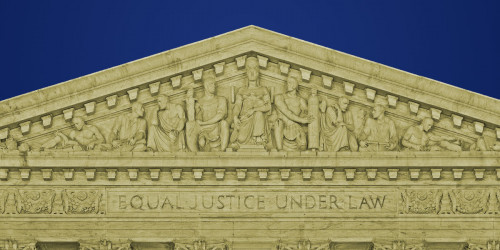“Pernicious.”
“Unprecedented... cringe-worthy.”
“Egregious.”
“Shocking.”
These are just some of the words that federal judges used in recent weeks to describe President Trump’s politically motivated and vindictive executive orders targeting law firms that have employed people or represented clients or causes he doesn’t like.
But our favorite word by far is “unconstitutional.”
EFF was one of the very first legal organizations to publicly come out in support of Perkins Coie when it became the first law firm to challenge the legality of President Trump’s executive order targeting it. Since then, EFF has joined four amicus briefs in support of targeted law firms, and in all four cases, judges from the U.S. District Court for the District of Columbia have indicated they’re having none of it. Three have issued permanent injunctions deeming the executive orders null and void, and the fourth seems to be headed in that same direction.
Trump issued his EO against Perkins Coie on March 6. In a May 2 opinion finding the order unconstitutional and issuing a permanent injunction, Senior Judge Beryl A. Howell wrote:
“By its terms, this Order stigmatizes and penalizes a particular law firm and its employees—from its partners to its associate attorneys, secretaries, and mailroom attendants—due to the Firm’s representation, both in the past and currently, of clients pursuing claims and taking positions with which the current President disagrees, as well as the Firm’s own speech,” Howell wrote. “In a cringe-worthy twist on the theatrical phrase ‘Let’s kill all the lawyers,’ EO 14230 takes the approach of ‘Let’s kill the lawyers I don’t like,’ sending the clear message: lawyers must stick to the party line, or else.”
“Using the powers of the federal government to target lawyers for their representation of clients and avowed progressive employment policies in an overt attempt to suppress and punish certain viewpoints, … is contrary to the Constitution, which requires that the government respond to dissenting or unpopular speech or ideas with ‘tolerance, not coercion.’”
Trump issued a similar EO against Jenner & Block on March 25. In a May 23 opinion also finding the order unconstitutional and issuing a permanent injunction, Senior Judge John D. Bates wrote:
“This order—which takes aim at the global law firm Jenner & Block—makes no bones about why it chose its target: it picked Jenner because of the causes Jenner champions, the clients Jenner represents, and a lawyer Jenner once employed. Going after law firms in this way is doubly violative of the Constitution. Most obviously, retaliating against firms for the views embodied in their legal work—and thereby seeking to muzzle them going forward—violates the First Amendment’s central command that government may not ‘use the power of the State to punish or suppress disfavored expression.’ Nat’l Rifle Ass’n of Am. v. Vullo, 602 U.S. 175, 188 (2024). More subtle but perhaps more pernicious is the message the order sends to the lawyers whose unalloyed advocacy protects against governmental viewpoint becoming government-imposed orthodoxy. This order, like the others, seeks to chill legal representation the administration doesn’t like, thereby insulating the Executive Branch from the judicial check fundamental to the separation of powers. It thus violates the Constitution and the Court will enjoin its operation in full.”
Trump issued his EO targeting WilmerHale on March 27. In a May 27 opinion finding that order unconstitutional, Senior Judge Richard J. Leon wrote:
“The cornerstone of the American system of justice is an independent judiciary and an independent bar willing to tackle unpopular cases, however daunting. The Founding Fathers knew this! Accordingly, they took pains to enshrine in the Constitution certain rights that would serve as the foundation for that independence. Little wonder that in the nearly 250 years since the Constitution was adopted no Executive Order has been issued challenging these fundamental rights. Now, however, several Executive Orders have been issued directly challenging these rights and that independence. One of these Orders is the subject of this case. For the reasons set forth below, I have concluded that this Order must be struck down in its entirety as unconstitutional. Indeed, to rule otherwise would be unfaithful to the judgment and vision of the Founding Fathers!”
“Taken together, the provisions constitute a staggering punishment for the firm’s protected speech! The Order is intended to, and does in fact, impede the firm’s ability to effectively represent its clients!”
“Even if the Court found that each section could be grounded in Executive power, the directives set out in each section clearly exceed that power! The President, by issuing the Order, is wielding his authority to punish a law firm for engaging in litigation conduct the President personally disfavors. Thus, to the extent the President does have the power to limit access to federal buildings, suspend and revoke security clearances, dictate federal hiring, and manage federal contracts, the Order surpasses that authority and in fact usurps the Judiciary’s authority to resolve cases and sanction parties that come before the courts!”
The fourth case in which EFF filed a brief involved Trump’s April 9 EO against Susman Godfrey. In that case, Judge Loren L. AliKhan is still considering whether to issue a permanent injunction, but on April 15 gave a fiery ruling from the bench in granting a temporary restraining order against the EO’s enforcement.
“The executive order is based on a personal vendetta against a particular firm, and frankly, I think the framers of our Constitution would see this as a shocking abuse of power,” AliKhan said, as quoted by Courthouse News Service. "The government cannot hold lawyers hostage to force them to agree with it, allowing the government to coerce private business, law firms and lawyers solely on the basis of their view is antithetical to our constitutional republic and hampers this court, and every court’s, ability to adjudicate these cases.”
And, as quoted by the New York Times: “Law firms across the country are entering into agreements with the government out of fear that they will be targeted next and that coercion is plain and simple. And while I wish other firms were not capitulating as readily, I admire firms like Susman for standing up and challenging it when it does threaten the very existence of their business. … The government has sought to use its immense power to dictate the positions that law firms may and may not take. The executive order seeks to control who law firms are allowed to represent. This immensely oppressive power threatens the very foundations of legal representation in our country.”
As we wrote when we began filing amicus briefs in these cases, an independent legal profession is a cornerstone of democracy and the rule of law. As a nonprofit legal organization that frequently sues the federal government, EFF understands the value of this bedrock principle and how it–and First Amendment rights more broadly–are threatened by President Trump’s executive orders. It is especially important that the whole legal profession speak out against these actions, particularly in light of the silence or capitulation of a few large law firms.
We’re glad the courts agree.











